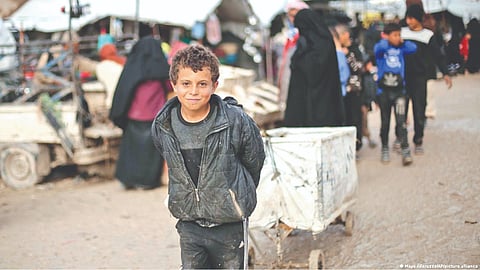

CATHRIN SCHAER
In May this year, an 8-year-old boy drowned in a sewage trench in the camp. In November, two girls, aged 12 and 15, were found in another sewage trench, reportedly beheaded after being sexually assaulted.
An expert in extremism told DW they had seen young children in al-Hol camp being taught to behead cats and dogs, practicing for recruitment to the extremist “Islamic State” (IS) group.
Al-Hol in north-eastern Syria, often described as “the most dangerous camp in the world,” is home to over 53,000 people. Although not all the inhabitants still support IS, they are best known as being the displaced families of the group, who were forced to come here when IS was defeated in its Iraqi and Syrian strongholds.
Most of those in the camp are from either Iraq or Syria but there are also between 10,000 and 11,000 foreigners from other countries, including in Europe, the US and Canada. The camp’s population consists mainly of women and children. Aid organizations estimate that between 60% and 64% of the camp’s population are children, and mostly under 12.
Given the conditions in the overcrowded camp, a lack of medical care, limited supplies and barely any education, life for the thousands of children in al-Hol was already hard. Over the past year, it has only become harder.
There were 126 murders and 41 attempted murders recorded in 2021, making it al-Hol’s most violent year. This year has been even worse, aid agencies said. Additionally, neighboring Turkey has been increasing air raids over the area because it considers the Syrian Kurds, who guard the camps, enemies.
With all that, it might seem that if you were a parent, you would not want your children trapped in such a situation. But some of the mothers in al-Hol are choosing exactly this fate for their families.
Over 30 countries, including several European nations, have repatriated their nationals from al-Hol, Human Rights Watch noted in a November report. In a press release this week, Save the Children said 1,464 women and children have returned to their home countries altogether since 2019, with a marked 60% increase in repatriations in 2022.
However some of the women approached by their governments decided not to take up the offer of repatriation. For example, the German Foreign Office told DW that the last woman who wanted to return to Germany came back in November with her four children.
“We assume that a low, double-digit number of German mothers and children are still in the Roj and al-Hol camps,” a spokesperson from the Foreign Office said in a statement. “However, as far as we know, the remaining women do not wish to return to Germany.” The same is also true for women from other countries.
The mothers who didn’t want to go home made that decision for a variety of reasons, explained Jo Becker, advocacy director for children’s rights at Human Rights Watch (HRW).
“In some cases, they didn’t want to live in a non-Muslim country or they feared discrimination or prosecution,” she said. “In other cases, their husbands may be in prison and they want to wait for his release, or don’t want to make a decision without him.
On the other hand, that may not necessarily be in the best interest of their children,” she pointed out. This is why some experts have suggested that countries should bring the children home, but leave the mothers in al-Hol, if that is what they want.
“Usually acting in the best interests of the child is to keep them with family members,” argues Anne Speckhard, director of the US-based International Center for the Study of Violent Extremism (ICSVE).
This article was provided by Deutsche Welle
Visit news.dtnext.in to explore our interactive epaper!
Download the DT Next app for more exciting features!
Click here for iOS
Click here for Android